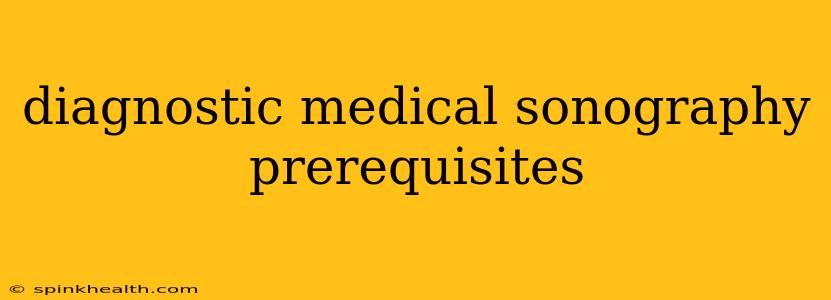Charting a Course to Becoming a Diagnostic Medical Sonographer: Prerequisites and Beyond
The world of diagnostic medical sonography is a fascinating blend of technology and human compassion. It's a field where you can use cutting-edge equipment to create images that help diagnose a wide range of medical conditions, playing a crucial role in patient care. But before you can wield that ultrasound transducer, there are prerequisites to navigate. Let's embark on a journey to explore what it takes to become a diagnostic medical sonographer.
What Education Do I Need to Become a Diagnostic Medical Sonographer?
This is often the first question aspiring sonographers ask. The path typically starts with an associate's degree (AS) or a bachelor's degree (BS) in Diagnostic Medical Sonography. These programs are rigorous, combining classroom learning with extensive hands-on clinical experience. Don't envision this as simply learning to push buttons; it's about mastering anatomy, physiology, pathology, and the intricate operation of sophisticated ultrasound machines. The curriculum also encompasses patient interaction, ethics, and record-keeping—essential skills for a caring and competent sonographer.
What Are the Specific Course Prerequisites for a Sonography Program?
While specific requirements vary between institutions, many programs share common prerequisites. These often include:
- High school diploma or equivalent: This is the foundational requirement for entry into almost all higher education programs.
- Completion of prerequisite courses: These usually include college-level courses in biology, anatomy, and physiology. Some programs might also require chemistry, physics, or even mathematics courses. Check with the specific program you're applying to for exact requirements.
- Minimum GPA: A competitive GPA is crucial, as sonography programs are often highly competitive. The required GPA will vary depending on the institution and program.
- Successful completion of entrance exams: Some programs might require the submission of standardized test scores, such as the TEAS (Test of Essential Academic Skills).
Think of these prerequisites as the building blocks upon which your sonography education will be constructed. A solid foundation in science and a strong academic record significantly enhance your chances of acceptance.
What Other Skills Are Important for a Successful Career in Diagnostic Medical Sonography?
Beyond academic qualifications, several key skills contribute to a successful sonography career. These include:
- Strong problem-solving skills: Interpreting ultrasound images requires keen observational skills and the ability to analyze complex information to identify potential issues.
- Excellent communication skills: Sonographers interact with patients, physicians, and other healthcare professionals; clear and compassionate communication is paramount.
- Manual dexterity: Operating ultrasound machines requires precise hand movements and a steady hand.
- Empathy and compassion: Patients undergoing ultrasounds might be anxious or in pain. A compassionate approach can significantly ease their experience.
- Ability to work independently and as part of a team: Sonographers often work independently, interpreting images and writing reports. However, collaboration with physicians and other healthcare professionals is crucial for optimal patient care.
These soft skills, paired with technical proficiency, shape a well-rounded diagnostic medical sonographer.
Is There an Age Limit for Applying to a Sonography Program?
There is generally no age limit for applying to a sonography program, provided you meet the academic prerequisites. Many individuals transition to sonography from other careers later in life, bringing valuable life experience and maturity to the field. Age is often not a barrier but rather a reflection of diverse pathways to a fulfilling career.
Are There Any Certification Requirements After Graduation?
After graduating from an accredited program, you'll typically need to pass a certification exam to practice legally as a sonographer. The American Registry for Diagnostic Medical Sonography (ARDMS) and the Cardiovascular Credentialing International (CCI) are prominent organizations that offer certifications in various sonography specializations, such as abdominal, obstetrics and gynecology, echocardiography, and vascular sonography. Certification demonstrates professional competence and opens doors to more job opportunities.
Embarking on the journey to become a diagnostic medical sonographer requires dedication, hard work, and a genuine passion for helping others. By diligently preparing for the educational prerequisites and cultivating essential skills, you'll increase your chances of achieving this rewarding career. Remember to research different programs and institutions to find the best fit for your individual needs and aspirations.

